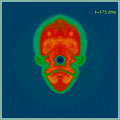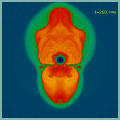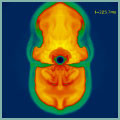
 |
 |
 |
 |
|
ProjectsPROMETHEUS/VERTEXPROMETHEUS/VERTEX is a multidimensional neutrino radiation hydrodynamics code which was developed at MPA to simulate supernova explosions of massive stars. For the supernova problem an accurate computation of the energy and lepton number source terms due to neutrino heating is essential. Hence, the Boltzmann equation of neutrino transport needs to be solved together with the hydrodynamics. Since the transport problem requires:
NumericsOn a radial ray, angular moment equations of the Boltzmann equation are discretized with backward time differencing, giving rise to a non-linear algebraic system which is solved with a Newton-Raphson procedure. Within a Newton-Raphson step, inversions of a block-pentadiagonal matrix with dense blocks are required. A similar Newton-Raphson procedure is employed for solving a model Boltzmann equation. Both solutions are iterated to consistency on each ray. The entire code has been vectorized. Parallelization is performed at a coarse level over the different radial rays. A mixed OpenMP/MPI programming model has been used to assign radial rays to different CPUs. Simulation Results The figure shows the snapshot from a simulation of the evolution
of the neutrino heated supernova shock in a 11.2 solar mass
star. The simulation was performd using a full 180 degree
computational grid. ContactKonstantinos Kifonidis |
|



